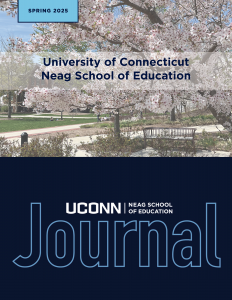Neag School Graduate Students Publish Third Issue of Education Research Journal
The UConn Neag School of Education’s academic journal has published its third issue, thanks to the hard work and dedication of a group of graduate students.
“We are pleased to share the third issue of the Neag School of Education Journal,” reads a letter from the journal’s board members in the Spring 2025 issue. “We take pride in providing a supportive “testing ground” for graduate authors to refine their original work in collaboration with our graduate-led editorial board. Fundamentally, the Neag School of Education Journal is committed to the growth and development of emergent educational researchers across fields. After much hard work and dedication from our authors and editorial board, we are thrilled to unveil the culmination of their efforts – three pieces that showcase the excellence of our 2025 edition.”
 The Neag School of Education Journal is an editor-reviewed, open-access, annual journal. Founded and run by graduate students and published online through the Neag School, its primary purpose is to offer a platform for graduate students to share their research and knowledge with academic communities. It also hopes to broaden and deepen the literature of education as written and experienced by graduate students and early-career scholars. Ten graduate students from the Neag School make up the journal’s current board.
The Neag School of Education Journal is an editor-reviewed, open-access, annual journal. Founded and run by graduate students and published online through the Neag School, its primary purpose is to offer a platform for graduate students to share their research and knowledge with academic communities. It also hopes to broaden and deepen the literature of education as written and experienced by graduate students and early-career scholars. Ten graduate students from the Neag School make up the journal’s current board.
The journal prizes pieces that seek to “improve education and social systems in order to facilitate increasingly effective, equitable, and socially just practices for educators and practitioners from a variety of fields, perspectives, and theoretical lenses as they serve their local communities.”
The three articles accepted and published in the Spring 2025 issue are:
- “Aspiration vs. Action in Multicultural Education: Examining Policy Revisions to Montana’s Indian Education for All” – a case study analysis that delves into the revisions that Montana House Bill 338 has produced to Montana’s Indian Education for All (IEFA) act alongside recent critiques of IEFA from Native American activists as made salient in the trial Yellow Kidney v. Montana.
- “Tier 1 Teaching in Practice: Examining the Use of SEB Strategies, Mental Health Resources, and Identifying Areas of Need for Future Support” – a reflection of research on the implementation of the Positive Behavioral Interventions and Supports framework in a Northeast U.S. school district.
- “Not Your Standard English Languages Arts Classroom: Critical Language Awareness Pedagogies in Secondary English” – an essay that explores the historical context of linguistic racism in secondary English and Language Arts (ELA) classrooms through the lens of Critical Language Awareness (CLA) pedagogies.
In addition to providing graduate students and early-career scholars an opportunity to share their work more widely, the editors say the journal fosters collaboration among students and their colleagues. It also helps to demystify the publishing process and supports editors as they move toward publishing their own work in the field. Making the journal open access was also important, ensuring that its content could serve as an available source of information for current and future practitioners. Importantly, authors maintain their copyright and thus can work on their pieces after publication for future submission elsewhere – a feature aligned with the journal’s orientation toward building authors’ capacity and opportunities.
The journal is accepting manuscripts for its fourth issue until June 30. Manuscripts must be one of the following four types: research articles, essays, literature reviews, or personal reflections. Of course, the manuscript must deal with a topic of interest to those in the field of education.
“We have many fantastic and dedicated people to thank for the realization of our third issue,” the letter from the board says. “To Dr. Jennie Weiner, our advisor, thank you for your tireless dedication to this journal and to students. You model to us what a human-centered and compassionate review process can be and have taught us enduring lessons as reviewers and researchers. Another thank you to Dr. Jason Irizarry, our dean, who has enthusiastically supported the journal from its inception and made it clear that our work and voices matter. … Finally, thank you to the authors of the pieces featured in this issue and all who submitted work. It goes without saying that this would be impossible without your contributions. We are immensely proud to feature your work in this issue.”
To learn more about the Neag School of Education Journal, visit education.uconn.edu/neag-journal.
Latest UConn Today
- UConn Health Neuromodulation Center of Excellence for VeteransConnecticut Passes Law to Establish UConn Health Neuromodulation Center of Excellence to Provide Veterans with Access to Therapy for Stroke Recovery.
- Picture This: Reflections of a Hospital CuratorAndre Rochester in his 3rd year as UConn Health’s Art Curator
- In Memoriam: Former Athletics Administrator and Trustee Phil BarryBarry dedicated over 60 years of service to the University
- Cuts to School Lunch and Food Bank Funding Mean Less Fresh Produce for Children and FamiliesDuring the 2022-2023 school year, about 28 million children ate lunch at school, with more than 14 million eating breakfast there
- UConn to Host 57th North American Power SymposiumNAPs serves as a launchpad for emerging scholars and a convening ground for frontier research in power systems, electric grid operations, renewable energy integration, and distribution-transmission coordination
- Lepowsky, Lurie Honored by Alma MatersThe Dean and Professor received alumni honors from Columbia, UCLA













